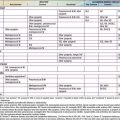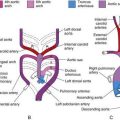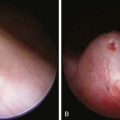Chapter 7 The Newborn
Parental Role in Maternal-Infant Attachment
Prenatal Factors
The early experience of being mothered may establish unconsciously held expectations about nurturing relationships that permit mothers to “tune in” to their infants. These expectations are linked with the quality of later infant-parent interactions. Mothers whose early childhoods were marked by traumatic separations, abuse, or neglect may find it especially difficult to provide consistent, responsive care. Instead, they may reenact their childhood experiences with their own infants, as if unable to conceive of the mother-child relationship in any other way. Bonding may be adversely affected by several risk factors during pregnancy and in the postpartum period, which undermine the mother-child relationship and may threaten the infant’s cognitive and emotional development (Table 7-1).
Table 7-1 PRENATAL RISK FACTORS FOR ATTACHMENT
From Dixon SD, Stein MT: Encounters with children: pediatric behavior and development, ed 3, St Louis, 2000, Mosby, p 74.
Many decisions have to be made by parents in anticipation of the birth of their child. The most important choice is that of how the infant will be nourished. Among the important benefits of breast-feeding is the role of promoting bonding. Providing breast-feeding education for the parents at the prenatal visit by the pediatrician and by the obstetrician during prenatal care can increase maternal confidence in breast-feeding after delivery and reduce stress during the newborn period (Chapter 42).
Peripartum and Postpartum Influences
Postpartum depression may occur in the 1st week or up to 6 mo after delivery and can adversely affect neonatal growth and development. Screening methods are available for use during neonatal and infant visits to the pediatric provider. Referral for care will greatly accelerate recovery (Table 7-2).
Table 7-2 EDINBURGH POSTNATAL DEPRESSION SCALE
INSTRUCTIONS FOR USERS
Edinburgh Postnatal Depression Scale
Name:
Address:
Baby’s age:
________________________________________________________________________________________________________________________________
Because you have recently had a baby, we would like to know how you are feeling. Please underline the answer that comes closest to how you have felt in the past 7 days, not just how you feel today.
________________________________________________________________________________________________________________________________
Here is an example, already completed.
I have felt happy:
Yes, all the time
Yes, most of the time
No, not very often
No, not at all
This would mean: “I have felt happy most of the time” during the past week. Please complete the other questions in the same way.
________________________________________________________________________________________________________________________________
In the past 7 days:
| 1. | I have been able to laugh and see the funny side of things |
| As much as I always could | |
| Not quite so much now | |
| Definitely not so much now | |
| Not at all | |
| 2. | I have looked forward with enjoyment to things |
| As much as I ever did | |
| Rather less than I used to | |
| Definitely less than I used to | |
| Hardly at all | |
| *3. | I have blamed myself unnecessarily when things went wrong |
| Yes, most of the time | |
| Yes, some of the time | |
| Not very often | |
| No, never | |
| 4. | I have been anxious or worried for no good reason |
| No, not at all | |
| Hardly ever | |
| Yes, sometimes | |
| Yes, very often | |
| *5. | I have felt scared or panicky for no very good reason |
| Yes, quite a lot | |
| Yes, sometimes | |
| No, not much | |
| No, not at all | |
| *6. | Things have been getting on top of me |
| Yes, most of the time I haven’t been able to cope at all | |
| Yes, sometimes I haven’t been coping as well as usual | |
| No, most of the time I have coped quite well | |
| No, I have been coping as well as ever | |
| *7. | I have been so unhappy that I have had difficulty sleeping |
| Yes, most of the time | |
| Yes, sometimes | |
| Not very often | |
| No, not at all | |
| *8. | I have felt sad or miserable |
| Yes, most of the time | |
| Yes, quite often | |
| Not very often | |
| No, not at all | |
| *9. | I have been so unhappy that I have been crying |
| Yes, most of the time | |
| Yes, quite often | |
| Only occasionally | |
| No, never | |
| *10. | The thought of harming myself has occurred to me |
| Yes, quite often | |
| Sometimes | |
| Hardly ever | |
| Never |
Response categories are scored 0, 1, 2, and 3 according to increased severity of the symptom. Items marked with an asterisk (*) are reverse scored (i.e., 3, 2, 1, and 0). The total score is calculated by adding the scores for each of the 10 items. Users may reproduce the scale without further permission providing they respect copyright (which remains with the British Journal of Psychiatry) by quoting the names of the authors, the title, and the source of the paper in all reproduced copies.
From Currie ML, Rademacher R: The pediatrician’s role in recognizing and intervening in postpartum depression, Pediatr Clin North Am 51:785–801, 2004.
The Infant’s Role in Maternal-Infant Attachment
Physical Examination
Examination of the newborn should include an evaluation of growth and an observation of behavior. The average term newborn weighs approximately 3.4 kg ( lb); boys are slightly heavier than girls are. Average weight does vary by ethnicity and socioeconomic status. The average length and head circumference are about 50 cm (20 in) and 35 cm (14 in), respectively, in term infants. Each newborn’s growth parameters should be plotted on growth curves specific for that infant’s gestational age to determine the appropriateness of size. Likewise specific growth charts for conditions associated with variations in growth patterns have also been developed. The infant’s response to being examined may be useful in assessing its vigor, alertness, and tone. Observing how the parents handle their infant, their comfort and affection, is also important. The order of the physical examination should be from the least to the most intrusive maneuver. Assessing visual tracking and response to sound and noting changes of tone with level of activity and alertness are very helpful. Performing this examination and sharing impression with parents is an important opportunity to facilitate bonding (Chapter 88).
lb); boys are slightly heavier than girls are. Average weight does vary by ethnicity and socioeconomic status. The average length and head circumference are about 50 cm (20 in) and 35 cm (14 in), respectively, in term infants. Each newborn’s growth parameters should be plotted on growth curves specific for that infant’s gestational age to determine the appropriateness of size. Likewise specific growth charts for conditions associated with variations in growth patterns have also been developed. The infant’s response to being examined may be useful in assessing its vigor, alertness, and tone. Observing how the parents handle their infant, their comfort and affection, is also important. The order of the physical examination should be from the least to the most intrusive maneuver. Assessing visual tracking and response to sound and noting changes of tone with level of activity and alertness are very helpful. Performing this examination and sharing impression with parents is an important opportunity to facilitate bonding (Chapter 88).
Implications for the Pediatrician
The pediatrician can support healthy newborn development in several ways.
Optimal Practices
A prenatal pediatric visit allows pediatricians to assess potential threats to bonding (a tense spousal relationship) and sources of social support. Supportive hospital policies include the use of birthing rooms rather than operating suites and delivery rooms; encouragement for the father or a trusted relative or friend to remain with the mother during labor or the provision of a professional doula; the practice of giving the newborn infant to the mother immediately after drying and a brief assessment; placement of the newborn in the mother’s room rather than in a central nursery; and avoiding in-hospital distribution of infant formula. Such policies (Baby Friendly Hospital) have been shown to significantly increase breast-feeding rates (Chapter 88.3). After discharge, home visits by nurses and lactation counselors can reduce early feeding problems and identify emerging medical conditions in either mother or baby. Infants requiring transport to another hospital should be brought to see the mother first, if at all possible. On discharge home, fathers can shield mothers from unnecessary visits and calls and take over household duties, allowing mothers and infants time to get to know each other without distractions. The first office visit should occur during the first 2 wk after discharge to determine how smoothly the mother and infant are making the transition to life at home. Babies who are discharged early, those who are breast-feeding, and those who are at risk for jaundice should be seen 1 to 3 days after discharge.
Assessing Parent-Infant Interactions
During a feeding or when infants are alert and face-to-face with their parents, it is normal for them to appear absorbed in one another. Infants who become overstimulated by the mother’s voice or activity may turn away or close their eyes, leading to a premature termination of the encounter. Alternatively, the infant may be ready to interact, whereas the mother may appear preoccupied. Asking a new mother about her own emotional state, and inquiring specifically about a history of depression, facilitates referral for therapy, which may provide long-term benefits to the child. Pediatricians may detect postpartum depression using the Edinburgh Postnatal Depression Scale (EPDS) at well child visits during the first year (Table 7-2).
Brazelton TB, Nugent JK. The neonatal behavioral assessment scale, ed 3. London: MacKeith Press; 1995.
Chaudron LH, Szilagyi PG, Kitzman HJ, et al. Detection of postpartum depressive symptoms by screening at well-child visits. Pediatrics. 2004;113(3):551-558.
Crockenberg S, Leerkes E. Infant social and emotional development in family context. In: Zeanah CH, editor. Handbook of infant mental health. ed 2. New York: Guilford Press; 2000:60-91.
Currie ML, Rademacher R. The pediatrician’s role in recognizing and intervening in postpartum depression. Pediatr Clin North Am. 2004;51:785-801.
de Onis M, Garza C, Onyango AW, et al. Comparison of the WHO child growth standards and the CDC 2000 growth charts. J Nutr. 2007 Jan;137(1):144-148.
Hodnett ED: Caregiver support for women during childbirth, Cochrane Database Syst Rev CD000199, 2002.
Kennell JH, Klaus MH. Bonding: recent observations that alter perinatal care. Pediatr Rev. 1998;19:4-12.
Philipp BL, Merewood A. The baby friendly way: the best breastfeeding start. Pediatr Clin North Am. 2004;51:761-783.
2005 Section on Breastfeeding, American Academy of Pediatrics: Breastfeeding and the use of human milk. Pediatrics. 2005;115:496-506.
Sims M, Sims TL, Bruce MA. Race, ethnicity, concentrated poverty, and low birth weight disparities. J Natl Black Nurses Assoc. 2008 Jul;19(1):12-18.
Swain JE, Lorberbaum JP, Kose S, et al. Brain basis of early parent-infant interactions: psychology, physiology, and in vivo functional neuroimaging studies. J Child Psychol Psychiatry. 2007;48(3–4):262-287.






